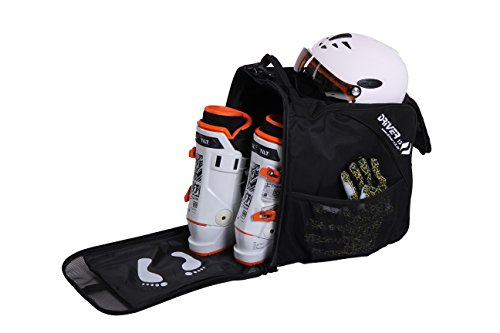Understanding the Importance of a Ski Boot Bag With Helmet Compartment
Why a Ski Boot Bag Is Essential
When we plan on hitting the slopes, we need to think about how to transport our gear safely and conveniently. A ski boot bag with a helmet compartment is more than just an accessory; it is essential for any skier or snowboarder. It provides a dedicated space for our boots, ensuring they remain warm and dry, while also housing our helmets safely. Imagine entering a chilly ski lodge after a long day and having to pull out cold, damp boots from a regular backpack—definitely not ideal. A ski boot bag keeps all our equipment in one place, prevents damage, and gives us easy access when we need to make quick changes.
The Added Convenience of a Helmet Compartment
Having a helmet compartment within the ski boot bag is a game changer. It allows us to protect our helmet from potential scratches or dents that could occur if stored elsewhere. Additionally, this feature helps in organisation, making it easy for us to grab our helmet as we head out the door, rather than rummaging around in our car or other bags. This small yet significant addition means we spend less time packing and more time enjoying the slopes.
Key Features to Look for in a Ski Boot Bag
Durability and Weather Resistance
When selecting a ski boot bag, we must prioritise durability. Skiing can be a harsh activity with varying weather conditions, so a bag made from robust, weather-resistant materials will keep our equipment safe from snow and moisture. Look for reinforced seams and heavy-duty zippers that can handle regular use and the wear that comes with transporting gear.
Comfort and Portability
Comfort is key, especially since we often have to carry our bags over long distances, whether it’s from the car park to the ski lodge or up a slope. A ski boot bag with padded straps and ergonomic designs will make a significant difference in the ease of transport. Some bags even feature a backpack-style option, allowing us to carry our gear comfortably on our back.
Size and Capacity
The size of the bag matters. We need to ensure it fits our ski boots properly, leaving room for our helmet without cramming everything in. Check the capacity specifications and make sure the bag can also accommodate additional items like gloves, goggles, and other small equipment, making it a versatile storage solution.
Ventilation Features
Ventilation is often overlooked but is crucial for maintaining our gear. A bag with ventilation ports will help to prevent moisture build-up within the boot compartment, keeping our boots dry and odour-free. This is especially important if we’re storing our boots after a day in wet conditions.
Best Ski Boot Bags With Helmet Compartment: Our Top Picks
High-Quality Options
While we can’t point to specific products, we can recommend looking for well-reviewed brands that consistently offer durable, functional bags. Popular features among top models include padded compartments for both boots and helmets, adjustable straps, ample pockets for accessories, and organisational elements that help us keep our gear in order. Don’t hesitate to explore customer reviews to find a bag that suits our specific needs.
How to Properly Use and Maintain Your Ski Boot Bag
Optimal Use
When using our ski boot bag, start by ensuring our boots are clean and dry before placing them inside. Secure all zippers and straps to maintain the bag’s shape and functionality. Instead of cramming excess items, we should only include gear that fits comfortably, allowing for easy access when needed.
Maintenance to Extend Lifespan
To keep our ski boot bag in top condition, regular cleaning is essential. A simple wipe-down with a damp cloth will remove snow and dirt, while ensuring that we don’t store any wet or muddy items inside will help avoid mildew. If the bag has removable liners, consider taking them out for thorough cleaning when needed.
Packing Tips for Maximum Efficiency and Safety
Strategic Packing Techniques
To maximise our packing efficiency, we should start by placing our boots in the base compartment. If possible, utilise the helmet compartment for helmets and strategically place smaller items like gloves and goggles in side pockets. This helps us keep frequently used items within reach and separates clean, dry gear from potentially wet ones.
Safety Considerations
Safety should always be a priority. Ensure our ski boot bag is properly secured in our vehicle and, when not in use, that it doesn’t obstruct visibility. Additionally, regular inspections of straps and compartments for signs of wear can prevent unexpected failures when we need our gear the most.



























